The Best Hotel Management Software
We reviewed the most popular platforms for hotels of all sizes, from single to multi-property operations. Our picks prioritize pricing and key features like customizable booking engines and dynamic pricing tools.
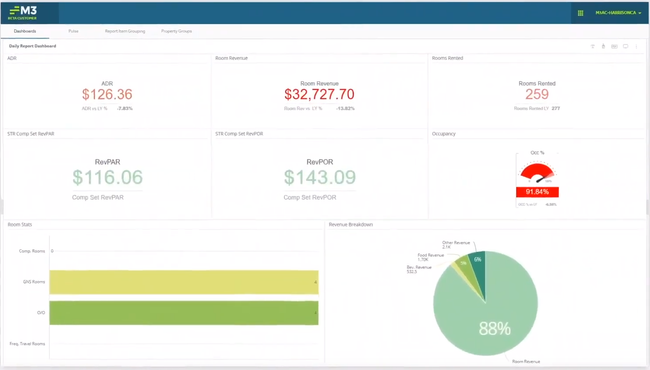
- Supports accounts payable, receivable, and reporting
- Invoicing feature allows scanning receipts and documents into PDFs
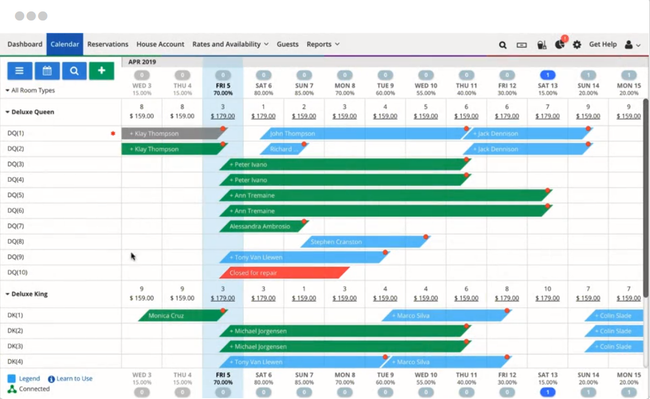
- Customize & print registration cards & receipts
- Includes strong reservation management tools
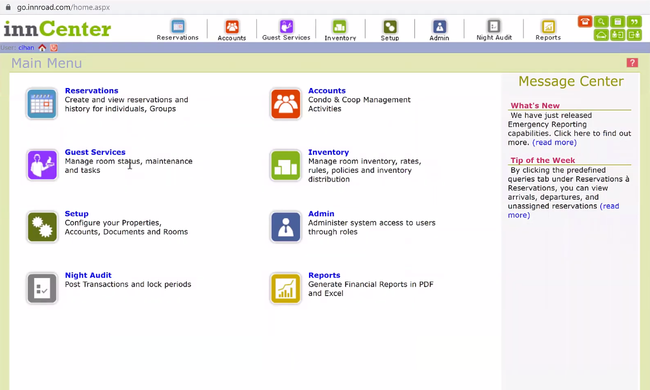
- Highly customizable booking engine
- Supports dynamic rate pricing
This guide reviews hospitality management software for small hotels to large chains, with capabilities like budgeting and package bundling features.
- M3 Accounting Core: Best for Large Chains
- Cloudbeds: Best for Small Hotels
- innRoad: Best for Independent Chains
- RoomKey PMS: Best for Boutique Resorts
M3 Accounting Core - Best for Large Chains
M3 Accounting Core’s budgeting and forecasting tool lets you manage financial planning across multiple properties. You can toggle between revenue views by single period, fiscal year, or day-by-day segments; that way, you can drill down into property-specific issues like inefficient pricing or high operational costs. This also helps you understand trends such as occupancy dips, like lower demand due to off-peak seasons.
M3’s accounting capabilities include forecasting by room or market segment. For example, if suites consistently show high demand, you can increase those rates during busier periods. Or, if you notice mainly business travelers dominate bookings, you can raise prices for popular travel days.
The tool’s customizable report columns help you compare projections with actuals from previous years. Assess budgets from other properties in the same chain and pinpoint high and low performers to share best practices or address location-specific issues. Analyze external data like reservations already booked against current forecasts; if demand falls short of expectations, you can run promotions.
With M3, you won’t have to jump between screens to see the impact of your decisions. It integrates reports into the forecasting tool, providing inline access to profit/loss or gross operating profit, all on the same interface. This helps you better align your projections with actual data. While the interface is functional, its traditional design—with grid layouts and basic chart styles—can feel a bit outdated. Despite this, M3 delivers deep financial insights, prioritizing practicality over modern aesthetics.
Learn more about pros, cons, and core features on our M3 Accounting Core product page.
Cloudbeds - Best for Small Hotels
The reservation management tools in Cloudbeds help smaller staff teams manage bookings more efficiently. Even during busy periods, your front desk employees can use automatically populated guest information to reduce manual entry errors. For example, you can type part of a customer’s name or confirmation number, and Cloudbeds instantly pulls up the right record, saving time and unnecessary scrolling. It also populates daily arrivals and departures, so there’s no need to track guest movements by hand.
You can also create new reservations in seconds with a prominent button available across multiple areas. This means you’re navigating fewer screens, streamlining customer interactions. For hostels or budget hotels, you can easily split bookings and move guests between rooms. Cloudbeds also supports group check-ins and receipt printing on the spot. You can customize and print registration cards or bed receipts in bulk or individually to fit your workflows.
Even when your resources are stretched, you can rely on these tools to deliver quick service, boosting the overall customer experience and maximizing your profits. If you have a hotel with 10 rooms, you can expect to pay $179/month, while 40 rooms put you at $291/month. You’ll need a custom pricing quote from Cloudbeds if you have over 40 rooms or need capabilities like multi-property management.
innRoad - Best for Independent Chains
innRoad’s booking engine is highly customizable, allowing you to tailor it to your unique brand style by adjusting colors and uploading property logos. Embed the engine directly into your website; its responsive design means guests can make reservations from any device, enhancing their experience while reinforcing your chain’s brand identity.
Beyond aesthetics, this tool supports dynamic pricing like surge alerts to help adjust your rates during high-demand periods, helping you stay competitive. You can also design bundled packages, combining room stays with add-ons like local tours or spa treatments. That way, you can cater to different guest preferences and boost per-stay earnings even more.
As customers make reservations, innRoad automatically updates room inventory, rates, and availability across all platforms, including Travelocity and Expedia. This helps minimize errors like double bookings. One of the more affordable options, innRoad is around $150/month for most properties.
RoomKey PMS - Best for Boutique Resorts
The profile match & merge feature in RoomKey PMS is a game-changer if your hotel relies heavily on loyalty programs and returning customers. You’re likely encountering tons of duplicate profiles from repeat bookings across different channels or slightly varied guest information. This tool consolidates customer profiles so you can accurately track visit histories and preferences.
RoomKey PMS uses its intelligent matching engine to quickly detect potential duplicates. It scans guest records across your database, searching for name variations, email addresses, phone numbers, and booking patterns. From there, your staff can review the suggested matches and confirm the changes. It then auto-updates merged profiles across the entire PMS, which is especially useful if you’re a large hotel chain or a multi-property setup.
Most importantly, RoomKey PMS provides an audit trail of every merge and update action. This gives you a clear chain of custody for all guest data changes. However, user reviews say reporting is a little shallow, with limited customization and a lack of detailed revenue tracking. RoomKey also does not publish standard monthly or annual fees. You’ll need to reach out for a custom quote.
What is Hotel Management Software?
Hotel management software is a property management system for the hospitality industry. From tiny boutique hotels to international resorts, this solution provides occupancy tracking, staff scheduling, and hotel accounting, such as room rate calculation and billing information.
Hotel management systems are unique because they balance guest and staff services. Use this single solution for tasks like tracking mini-bar purchases, adjusting housekeeping schedules, or updating room prices across multiple channels. These abilities allow you to streamline day-to-day tasks without neglecting long-term goals.
Hotels operating restaurants, spas, entertainment venues, and convention centers can use management software to coordinate with each branch of their business. Thanks to all-in-one hotel management software, your front office can control every aspect of your hotel.
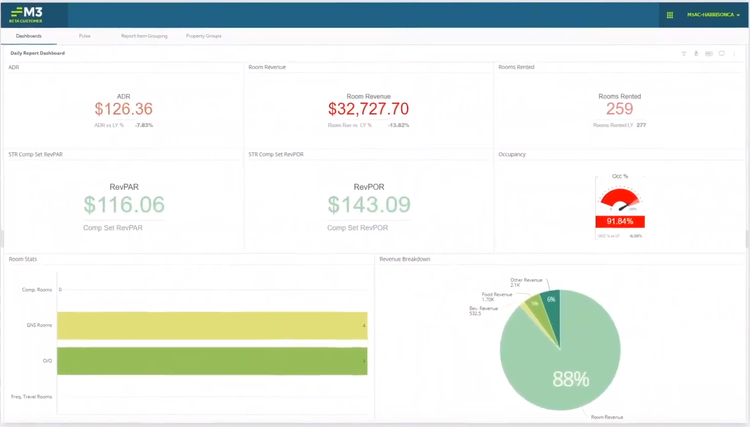
Key Features
- Booking Engines: Create an easy-to-use field for online booking requests. Manage incoming reservations and modify existing ones. User-friendly for guests and front office staff.
- Occupancy Rates: The system tracks how many guests are on the property at any given time. Review the current day rate and look ahead at future occupancy.
- Departures and Arrivals: Track incoming arrivals against outgoing departures. Prevent overbooking and vacancies with accurate room reporting.
- Digital Key Lock Automation: Activate and deactivate key cards as rooms are changed over.
- Room Rate Calculation: Accurately display room prices and automate package rates.
- Room Service Charges and Meal Plans: Monitor charges per room or individual guest for better revenue management.
- Credit Card Processing: Process credit card transactions and reduce point of sale fraud.
- Food, Entertainment, and Travel Reservations: Offer better guest services by scheduling reservations between different restaurants, conferences, entertainment venues, or travel agencies.
- Cleaning Service and Maintenance Requests: Send and receive housekeeping requests to a central computer or mobile device. Use two-way communication to track maintenance requests.
- Inventory Management: Maintain stock of hotel industry staples like soap, shampoo, and coffee. Minibar management systems specifically track individual room inventories.
- GDS and Channel Manager: Use a Global Distribution System to transmit room inventory to booking sites and travel agencies. Change prices simultaneously on all online channels.
Benefits
The main benefits of using an all-in-one hotel management software:
Automated Check-In and Check-Out Processes
One of the biggest tools provided by hotel management software is automated check-in/check-out. Track arrivals, departures, and occupancy rates from a real-time dashboard to stay on top of your hotel’s needs. Improve guest experience by getting everyone into their prepared rooms sooner.
Housekeepers must know when rooms are vacant to get in and clean them before new guests check in. Automating the process lets housekeepers work more efficiently by skipping occupied rooms
Overbooking is a major problem for hoteliers, in part because direct booking sites allow multiple users to schedule reservations at the same time. By getting accurate occupancy in real time, you can prevent double-booking a room and avoid turning guests away when there are limited vacancies.
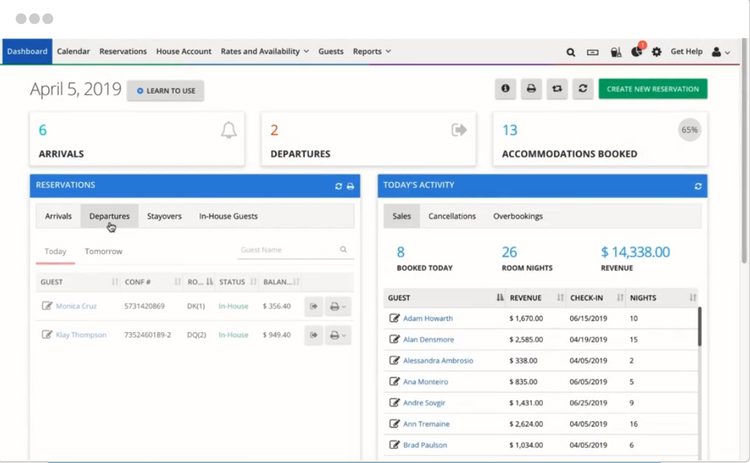
Easier Staff Scheduling and Payroll
Hotel operations employ a lot of people. Hospitality software also provides scheduling modules for all of your staff departments. Easily cover all shifts for front desk, concierge, housekeeping, custodial, and recreation by using a single application. Staff can use mobile versions of the software to request vacation, swap shifts, or call in sick.
Manage payroll with software to avoid payment errors. The system can track individual hours worked and then calculate taxes specific to your state.
Coordinate Between Multiple Properties
If your resort has multiple buildings, conference centers, restaurants, bars, or entertainment, you’ll need hotel management software to coordinate between different departments to ensure guests have the best experience possible. Manage room changes, restaurant reservations, and other adjustments from a single application.
GDS and channel management software allow for standardized coordination whenever you update pricing or room availability. For example, various travel agents and booking sites allow guests to reserve rooms without contacting your hotel. Each of these sites uses its own formatting for the reservation fields. GDS eliminates the confusion caused by these different booking methods. A guest can arrange their trip on Expedia or Tripadvisor at the correct rates without causing problems for your booking system.
Guest Billing and Contact Profiles
Did a guest use the mini-bar or enjoy a movie? Hotel management software alerts you to any additional room charges before you deliver the final bill. Or track comped amenities to ensure your hotel stays above the bottom line.
For example, if you upgrade a newlywed couple from a pool-side room to an ocean view, that change can be recorded in their guest profile.
If your hotel is part of a franchise, you can use hotel management software to track loyalty programs across multiple locations.
Pricing
Pricing for hotel management platforms can vary based on property size, features, and licensing models. Here’s a realistic overview:
Small Hotels (1–100 rooms):
- Perpetual License: Approximately $1,000–$6,000
- Subscription: Around $50–$1,000 per month
Mid-Sized Hotels (101–300 rooms):
- Perpetual License: Approximately $6,000–$15,000
- Subscription: Around $500–$2,000 per month
Large Hotels (301+ rooms):
- Perpetual License: Approximately $15,000–$50,000
- Subscription: Around $1,500–$5,000 per month
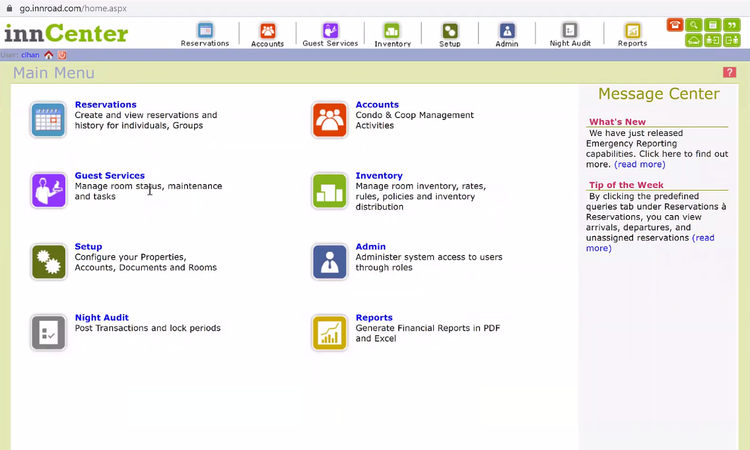
What Does Your Hotel Need?
The hotel property management software you need will depend on your business. The amount of rooms you have, whether you have a restaurant or bar onsite, and the size of your staff will all determine what scope of software you should get.
- Bed & Breakfast: any rental property with 4-11 rooms, generally located within a refurbished residence, may be affiliated with an Airbnb. Basic accounting software and an online booking engine may be all you need.
- Hostel: a rental property with dormitory-style rooms and shared facilities like kitchens and bathrooms. GDS and channel management are popular for reaching international customers.
- Boutique Hotel: any hotel with 100 rooms. These small hotels may focus on providing a themed experience. Because of their specialized services, they usually use specific software, like minibar management.
- Hotel: the average independent hotel has 100 rooms, more than boutiques and B&B but fewer than large resorts.
- Resort: any hotel with thousands of rooms, multi-room suites, or multiple buildings on a single premises may be connected to a conference center. Popular software for resorts offers streamlined cleaning and maintenance requests.
- Multi-Location Hotel Chain: any group of hotels owned by a single hospitality business. Chains may have guest houses, cabins, or bungalows for vacation rentals. They usually need the most comprehensive software options to cover all their needs.
Smaller hotels, such as boutiques and B & Bs, can manage with limited-scope software that covers the basics of payroll, scheduling, and occupancy. Larger hotels and chains will need comprehensive software to maximize as many features as possible.















